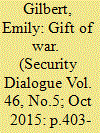| Srl | Item |
| 1 |
ID:
141459


|
|
|
|
|
| Summary/Abstract |
As part of the counterinsurgency initiatives in Afghanistan and Iraq, military forces have been making payments to civilians in cases of ‘inadvertent’ injury, death and/or damage to property. There are no legal norms governing civilian compensation in war. Rather, military payments are seen as a way to help ‘win’ the hearts and minds of the population. This article examines this turn to military payments, with a focus on US practices and the implications for our understanding of contemporary changes to warfare. I suggest that while monetary payments can alleviate short-term economic need, the lack of legal liability is problematic as it may help amplify the impunity of warring soldiers. The article begins with an overview of the bureaucratic ways in which monetary values are attributed to death and injury. It then turns to consider how military payments reinforce the notion of ‘collateral damage’ that is legitimized in international humanitarian law. Finally, I draw upon theories of the gift, and of the gift of war, to interrogate the affective register in which military payments are made, inserted as they are in narratives of sympathy and condolence that bind the giver and receiver in relations of indebtedness and dependence.
|
|
|
|
|
|
|
|
|
|
|
|
|
|
|
|
| 2 |
ID:
141778


|
|
|
|
|
| Summary/Abstract |
As part of the counterinsurgency initiatives in Afghanistan and Iraq, military forces have been making payments to civilians in cases of ‘inadvertent’ injury, death and/or damage to property. There are no legal norms governing civilian compensation in war. Rather, military payments are seen as a way to help ‘win’ the hearts and minds of the population. This article examines this turn to military payments, with a focus on US practices and the implications for our understanding of contemporary changes to warfare. I suggest that while monetary payments can alleviate short-term economic need, the lack of legal liability is problematic as it may help amplify the impunity of warring soldiers. The article begins with an overview of the bureaucratic ways in which monetary values are attributed to death and injury. It then turns to consider how military payments reinforce the notion of ‘collateral damage’ that is legitimized in international humanitarian law. Finally, I draw upon theories of the gift, and of the gift of war, to interrogate the affective register in which military payments are made, inserted as they are in narratives of sympathy and condolence that bind the giver and receiver in relations of indebtedness and dependence.
|
|
|
|
|
|
|
|
|
|
|
|
|
|
|
|